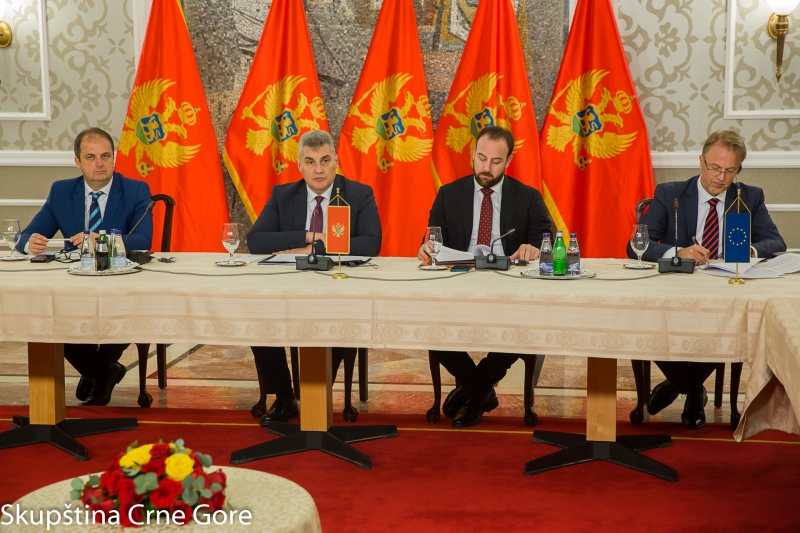The meeting was also attended by members of the Montenegrin Parliament, who are heads of permanent delegations to international organisations and regional initiatives.
The following delivered opening remarks: President of the Parliament of Montenegro Mr Ivan Brajović, Chairperson of the Committee on International Relations and Emigrants Mr Andrija Nikolić and Head of the EU Delegation to Montenegro Mr Aivo Orav.
In his opening remarks, President Brajović welcomed the return of the enlargement policy into the focus and the intention for opening up more space for parliaments and parliamentarians, and therefore for our citizens, in a more credible, trustworthy and clear way.
He reminded that the messages of support that Montenegro received during all the international meetings this year, including by the SAPC in the previous two days, encourage it to keep a leadership role in the integration process. “Montenegro, as the first next member state, with measurable results and a foreign policy harmonised with the EU foreign policy, and a constructive neighbourly policy, despite the challenges it faces, will be a strong incentive for other aspirants to take on such policies and values”, Mr Brajović said.
Speaking about the current political and social environment, President Brajović stated that the adoption of the Law on Freedom of Religion or Belief and the Legal Status of Religious Communities was a natural sequence in the rounding up of the national and state identity of Montenegro. “It was necessary to adopt this Law in order to regulate this area which had been regulated in distant 1977, in an appropriate manner that corresponds to the reality of the Montenegrin society. Dissatisfaction of one segment of our society was not a surprise, which had been preceded by the inappropriate resistance of some opposition MPs and one religious community, first to the adoption and then to the implementation of the Law”, the President of the Parliament stressed.
He noted that the “the government has shown a high degree of understanding and tolerance, while there is a huge number of citizens who do not support anti-state and often very offensive protest messages. In doing so, we prove that we respect the right to express a different opinion, despite the easily recognisable manipulative discourse of church gatherings. In a civil society, peaceful protests are part of the democratic achievements, but majority of Montenegrin citizens show support for policies and a vision for the development of society in elections, not in the street”.
Mr Brajović also indicated that overcoming challenges and addressing the on-going issue is not only the responsibility of the ruling majority but also of the opposition parliamentary parties.
“For a truly democratic society, the voice of the opposition must also be heard through a clear and constructive position in the Parliament. Everything else is mere criticism, which does not contribute to the necessary development of society. Our actions should be beneficial to the civil society and the citizens themselves, regardless of political choice. We are ready for dialogue. But in order to achieve this we need defined views and clear policies. We face the challenges regarding further strengthening of national institutions, achieving measurable results in the area of the rule of law, visible economic empowerment, and transparent and impartial media work. These goals will be achieved faster with more constructive participation of the opposition”, Mr Brajović emphasised.
Head of the EU Delegation to Montenegro Mr Aivo Orav addressed the attendees, stressing that during the previous period it was repeatedly confirmed that the enlargement policy would remain high on the agenda of the new composition of the European Commission and stated that the new enlargement methodology represented an opportunity for the region, as well as an incentive for Montenegro.
He thanked Montenegro for being a significant partner of the European Union and praised its efforts internationally and in aligning its foreign policy with the European Union’s foreign policy.
Ambassador Orav emphasised that dialogue was an important element both in Montenegro and in the entire region. "The Delegation of the European Union is following the situation regarding the Law on Freedom of Religion and wants to encourage all parties to come to a solution in order to reduce the current tensions," he said.
In his opening remarks, Chairperson of the Committee on International Relations and Emigrants Mr Andrija Nikolić said: "There is a tendency in the region of strengthening and increasing nationalist rhetoric, so it is clear that this is the result of a deadlock in the promotion of European policies and the spread of those policies in the region. The response to this is strengthening of political awareness, both in the Western Balkans and in the EU. It is also necessary to respond politically and anticipate certain processes that may stand in the way of further reorientation of Western Balkan societies towards the European values system”, Mr Nikolić, MP, stressed.
With gratitude for the continued support of the European Union in achieving the strategic goals of Montenegro, MP Nikolić emphasised that enlargement policy should remain high on the list of priorities of the European Union new institutions. He stressed that the process of the EU enlargement and full unification is the optimal path for Montenegro, for the region and Europe as a whole. "I am convinced that there is always enough room for the EU to take a more determined approach to its most successful policy - enlargement," MP Nikolić said.
Chairperson of the Committee on International Relations and Emigrants Mr Andrija Nikolić recalled the importance of bringing together young parliamentarians from the EU Member States and the Western Balkans and expressed confidence that such framework of gathering would help to better understanding and cooperation, as well as with regard to the overall integration of the Western Balkans into the EU.
Footage - President of the Parliament and parliamentarians at the meeting with the EU ambassadors
Speech of President Brajović
Speech of Ambassador Aivo Orav
Speech by Chairperson of the Committee on International Relations and Emigrants Mr Andrija Nikolić












